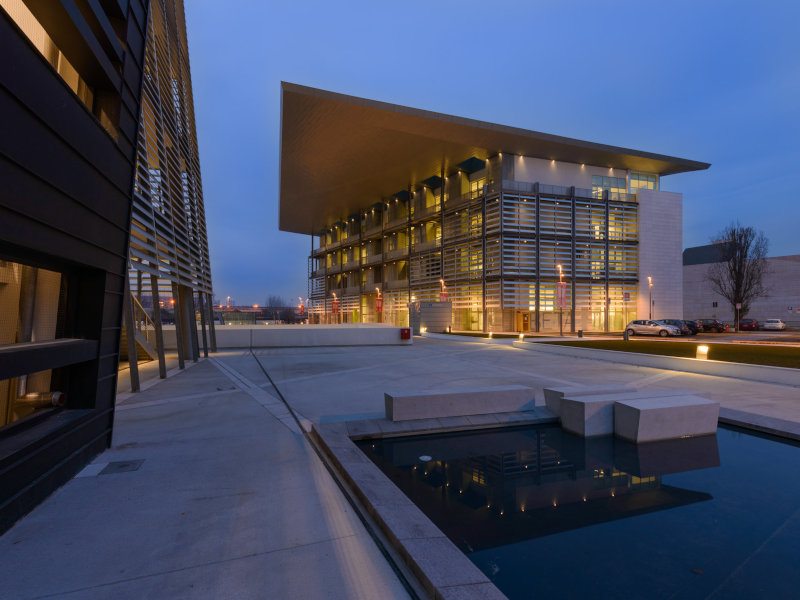DESC (Data-Centric Environmental Studies Centre) studies the complex interactions between humans and the environment, aiming to protect the planet and its resources through data analysis and technological innovation.
Its mission is to study, model, and develop eco-sustainable solutions to promote the ecological transition.
DESC seeks to improve interactions across research fields by fostering and creating interdisciplinary collaborations to address critical environmental challenges.

We develop solutions to transform urban and industrial waste into bio-resources, supporting the circular economy.
Key topics:
We monitor and model the environmental fate of micro-pollutants and emerging contaminants in environmental, food, and biological samples.
Key topics:
We assess product and process life cycles to minimise risks and environmental impacts.
Key topics:
We work to decarbonise the building sector, which accounts for around 40% of global CO2 emissions, through innovative solutions based on predictive models and advanced technologies.
Key topics:
This page showcases ongoing projects that tackle DESC’s key challenges. The Horizon Europe project “BoSS - Bauhaus of the Seas Sails” have received additional funding from the DAIS Excellence Project as it involve researchers from various fields, promoting interdisciplinary research.
See the project description on the Department website: PNRR projects [ITA].
See the project description on the Department website: PNRA and PRA projects [ITA].
See the project description on the Department website: Horizon 2020 projects [ITA].
See the project description on the Department website: Horizon Europe projects [ITA].
See the project description on the Department website: ERC projects [ITA].
See the project description on the Department website: Marie Curie projects [ITA].
See the project description on the Department website: COST projects [ITA].
See the project description on the Department website: Other national projects [ITA].
See the project description on the Department website: Other international projects [ITA].
One of DESC’s key objectives is to promote scientific activities and enhance its international recognition.
To improve DESC’s appeal for international recruitment, a Visiting Scholar Programme has been established to support strategic collaborations.
Polymers commonly used, such as polyolefins (e.g. polyethylene) and polyethylene terephthalate (PET), are essential materials for everyday life, and modern society could not exist without them. However, their production and use pose significant environmental challenges, including the depletion of fossil resources, greenhouse gas emissions, and environmental pollution resulting from microplastic formation.
At present, 90% of the polymers used daily still originate from non-renewable fossil resources. The handling of plastic waste underscores a critical situation:
These figures highlight the urgency of adopting more sustainable and circular approaches in polymer production and management.
Dr. Alexandra Zamboulis, a member of Professor Dimitrios Bikiaris’ research group at the Department of Chemistry, Aristotle University of Thessaloniki, was a Visiting Scholar at Ca’ Foscari University of Venice for four weeks in September 2024, working with Professor Fabio Aricò on this topic. With over 55 scientific publications in international journals, Dr Zamboulis actively participates in research projects funded at both national and European levels.
The project is based on an interdisciplinary study aimed at developing innovative sustainable solutions in accordance with the principles of Green Chemistry. The primary objectives are:
The project closely relates to issues concerning the management of macro-pollutants, including plastics and microplastics, as well as the reduction of environmental risks and impacts throughout the lifecycle of products and processes.
On 8 October 2024, Dr Zamboulis delivered a seminar that explored strategies for synthesising novel bio-based polymers, with a focus on vanillic acid-based polyesters. She also presented additional solutions for enhancing the sustainability of commonly used polymers, along with discussions on the pressing issue of microplastics.
Understanding the processes that have led to variations in sea levels throughout geological history is essential for evaluating their significance to future local scenarios. The research project led by Professor Alessio Rovere offers a unique opportunity to gain deeper insights into the mechanisms influencing sea levels, aiding in predicting and managing future climate change challenges. The project adopts an interdisciplinary approach, bringing together geologists, modellers, and oceanographers.
For two weeks in June 2024, Professor Luigi Jovane [POR] (Instituto Oceanográfico da Universidade de São Paulo) was hosted at DAIS to contribute to developing the research project.
The project is part of the department’s long-term research into past and present climate in collaboration with the National Research Council and various international partners.
The primary objectives of the project are:
Accurately modelling the extreme behaviour of many real-world phenomena is crucial for evaluating and managing the risks posed by environmental hazards to critical infrastructure, which also impact regulatory policies. Climate change has heightened the need to develop advanced statistical tools to better understand environmental risks associated with increasingly frequent extreme events.
In recent years, two modern approaches have gained attention and are advancing rapidly:
The research conducted by Professor Ilaria Prosdocimi’s Statistics group, in collaboration with Claudia Neves from King’s College London, who was a Visiting Scholar at Ca’ Foscari University for one week in February 2024, aims to: